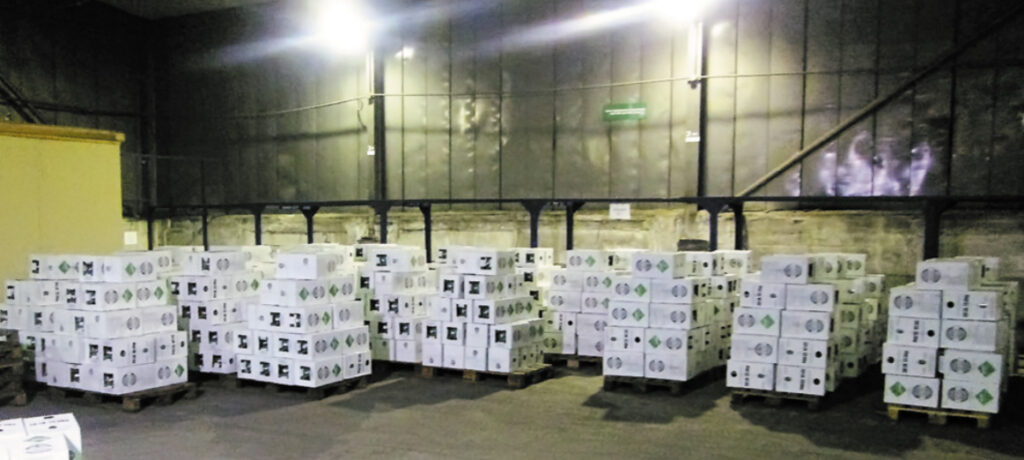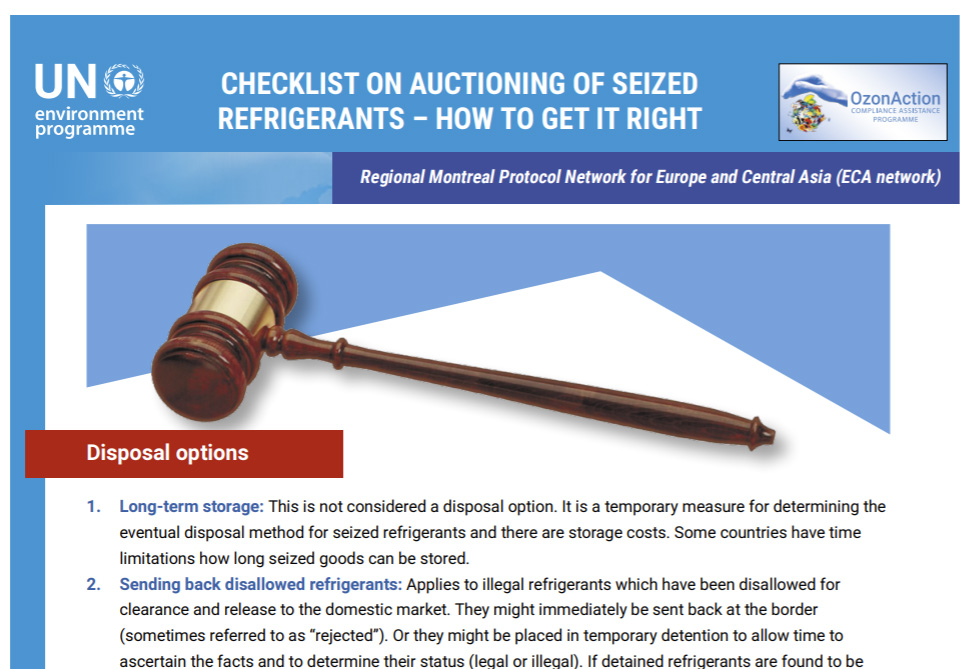Europe must act on F-gas enforcement
- PostedPublished 10 September 2020
Tide slowly turning on Europe’s illegal refrigerant trade but more action needed
A RECENTLY announced review of the European F-gas Regulation could help combat the continent’s ongoing and extensive illegal refrigerant trade.
The Combined Evaluation Roadmap/Inception Impact Assessment, published by the European Commission (EC) in June, aims to research, outline and assess the effectiveness of the F-gas regulation enforcement and phase-down quota system.
Among the issues highlighted in the review are the misuse of the quota system and illegal imports. A “harmonised EU approach” is also suggested, if overarching emissions targets are to be met, instead of relying solely on the independent efforts of the 27 member states.
The European Fluorocarbons Technical Committee (EFCTC) has welcomed the review and stated that enforcement is crucial to tackling ongoing problems. Dr Nick Campbell, chairman of the EFCTC, said: “There is evidence of large quantities of illegally imported HFCs entering the European Union and this must be addressed”.
Currently, the EC plans to complete its review by the second quarter of 2021 and has launched a public consultation window that will run until 29 December.
This will allow associated authorities to provide feedback, which should help steer regulatory amendments; contributors include the German Refrigeration and Air-conditioning Association (DKV) and American multinational 3M.
The European F-gas Regulation, which was introduced in 2015, is designed to reduce the use of fluorinated greenhouse gases (F-gases) – including common hydrofluorocarbon (HFC) refrigerants such as R134a – that cause global warming.
The introduction of the F-gas regulations resulted in a reduction of availability and hike in price of many a refrigerant, which prompted significant illegal trade. The EC initially downplayed the matter but it has since been more acknowledging of the issue and has taken countering action.
Executive vice president of the EU, Frans Timmermans, outlined the EC’s efforts in a parliamentary questions letter published in July; he highlighted how that Member States had been asked to step up enforcement, that expert groups had been formed to share best practices and that experts and authorities had been engaged to “facilitate better control”.

Timmermans also explained that the EU had integrated trade restrictions for HFCs into customs goods classifications, meaning importers will need to be registered with the F-gas Portal & HFC Licensing system before the refrigerants can be released.
This will tie in with new trade restrictions that are being built into the EU Single Window environment for customs – an electronic service that allows parties to input and exchange standardised documents for trading goods. Consequently, in a move that should reduce illegal activity, shipments should be automatically checked for compliance.
While unquestionably good news, there is still much ground to cover given the evident scale of the illegal refrigerant trade. The EFCTC itself published a release in June stating that illegal imports could account for 34 million tonnes of CO2 equivalents (eqT) – or, to put things in perspective, 33 per cent of 2018’s legal F-gas quota.
The data, which was accumulated by analytics and advisory specialist Oxera Consulting, revealed a significant disparity of 19 million CO2eqT between reported 2018 Chinese exports to the EU and registered EU imports from China.
A 40 per cent hike in HFC exports between 2016 and 2018 from China to surrounding EU countries was also identified, which reputedly equates to 15 million CO2eqT – with those HFCs then reportedly making their way into other regions, stoking the illegal trade.
The unchecked activity has a hefty impact on larger organisations, let alone smaller businesses; refrigerant manufacturer Koura, formerly Mexichem Fluor, reported Q1 2020 revenues of $182 million ($A253 million) as a case in point – a figure that represented an 11 per cent slump compared to 2019 and a drop that was attributed primarily to increasingly significant illegal trade.
However, environmental and financial implications are not the only outstanding difficulties; REFCOM, the main F-gas certification organisation in the UK, has issued a warning about illegally imported refrigerants after flammable counterfeit “R134a” was seized.
A tip-off alerted REFCOM, which promptly contacted officials who confiscated the illegal products that were being used by a firm in Derbyshire. Even though the gas used was advertised as R134a, it transpired to indeed be flammable – thus posing a significant risk – unlike pure and authentic R134a.
While the unidentified refrigerant was only fit for destruction, seized but otherwise safe illegal refrigerants can be difficult to dispose of. Fortunately, the United Nations Environment Programme (UNEP) recently published a new document called Checklist on auctioning of seized refrigerants: How to get it right.
The document, which is available online, explains to Montreal Protocol members in Europe and Central Asia as to how best to dispose of seized refrigerants; methods explained include rejection back to the source market, destruction and export for destruction.
It also explores how to safely auction refrigerants when applicable and provides an extensive series of checklists to permit safe, successful refrigerant auctions.
Such advice is likely to come in considerable use, given the quantity of refrigerants still being taken in by authorities. In Greece alone, according to a story published in July by UK-based specialist publication Cooling Post, a truck containing 3.5 tonnes of smuggled non-refillable refrigerant cylinders was intercepted by police.
Dutch authorities subsequently stole the limelight by intercepting 14 tonnes of refrigerant, thanks to a heads-up from the European Anti-Fraud Office (OLAF). According to their report, the shipment was estimated to have a footprint of 2807 tonnes of CO2 equivalent.OLAF later trumped that figure once again by steering Romanian authorities to a suspicious shipment from China, which transpired to be an illegal import of 76 tonnes of non-refillable refrigerant cylinders.

Cooling Post also stated that officials in Zagreb, Croatia, seized 22 cylinders of R134a. The gas totalled some 300kg and was in illegal non-refillable cylinders; reportedly, the smugglers were hit with a fine of €8,715 ($A14,200) for the gas itself plus another $A5750 for its destruction.
Arrests are being made when appropriate, which should further blunt the enthusiasm of those breaking the law; in July, for example, the Spanish newspaper El Mundo reported that five people were arrested at a refrigerant recovery company that was operating illegally. The company’s improper disposal methods had reportedly caused $A13m worth of environmental damage.
Changes are also occurring on a country-by-country basis to combat illegal activity; the Federal Ministry of the Environment, Nature Conservation and Nuclear Safety (BMU) agency of the German government has announced a draft bill that entails introduces new documentation requirements for every step of the refrigerant production and usage chain.
Authorities, as a result, would have a comprehensive log of supply and use of refrigerants which – in conjunction with penalties for illegal usage – would hopefully greatly reduce the illegal use and sale of F-gases.
The draft law, that said, has been met with myriad question marks by German industry. A joint paper published in August by associations including The Federal Association of German Refrigeration Plant Builders (BIV) widely supported the proposal but raised several key issues.
Among the concerns is the fact that introducing additional regulation seems moot when authorities are struggling to monitor and enforce existing regulations alone.
Simply adding new laws is deemed by the associations to be pointless as a result and will only increase the burden on companies operating legally – a move which could hit smaller businesses particularly hard and reduce their competitiveness.
Online stores stoking Europe’s illegal refrigerant woes
A report by UK specialist news site Cooling Post has once again demonstrated the ease of access to illegal refrigerants in Europe.
In particular, its recent story – called Chasing F-gas Shadows – focused on a Latvian website dubbed refrigerantgas.eu. The site, which was still live at the time of publication, lists an array of refrigerants in both refillable and illegal non-refillable storage methods.
Among the refrigerants offered are R134a, R404a and R32. A single 13.6kg cylinder of R134a is priced at €169.50 excluding taxes ($A274), with discounts being offered on larger purchases and delivery being promised in three to seven days.
Disconcertingly, significant volumes of refrigerant appear to be on hand; 40 disposable 13.6kg cylinders of R134a were being offered as a bulk deal for $A9070. Anyone can seemingly buy refrigerant and the site lists no mentions of F-gas compliance or the required returns policy for refillable containers.
“Recent investigations by the Cooling Post into just one online store offering refrigerant in contravention of the F-gas regulations reveals links to Eastern European crime, exposes failings in the UK company registration system and highlights the inadequacies of the European enforcement agencies,” said the article.
Cooling Post also identified other potential refrigerantgas.eu links to illegal activities in Eastern Europe, as well as what appeared to be a connection to the Chinese refrigerant manufacturer Zhejiang Yonghe Refrigerant Co – which has since denied any connection in a subsequent story by Cooling Post.
Will Liao, director of the international trade department of Zhejiang Yonghe, said the company’s trademark was being used without authorisation and that it had no connection to the website.
Speaking to Cooling Post, in a story titled Chinese F-gas Manufacturer Denies Any Connection With Illegal Trade, Liao said: “We by no means will do illegal business and we don’t have any subsidiary companies in the EU or any countries near the EU.”
- CategoriesIn SightGlass
- TagsIllegal refrigerant, illegal refrigerants, SightGlass News Issue 21

